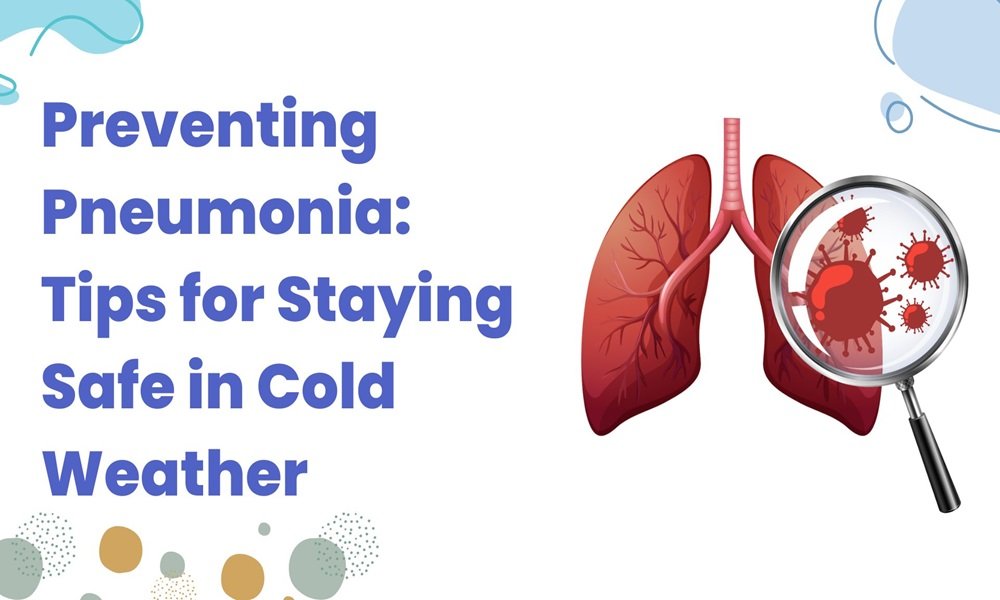


Protect Yourself from Pneumonia This Winter As winter arrives and temperatures dip, our bodies become more vulnerable to various respiratory infections, including pneumonia. Pneumonia is a serious lung infection that can lead to hospitalization and even life-threatening complications, especially for high-risk groups such as older adults, young children, and those with chronic health conditions. Fortunately, pneumonia is preventable and treatable with timely precautions and proper medical care.
What is Pneumonia?
Pneumonia is an infection that inflames the air sacs in one or both lungs. These sacs may fill with fluid or pus, causing symptoms such as:
- Persistent cough (with or without mucus).
- Chest pain that worsens during breathing or coughing.
- Fever, chills, or sweating.
- Fatigue and confusion, particularly in older adults.
- Shortness of breath.
Identifying the signs early and consulting a healthcare provider can prevent complications and ensure a swift recovery.
Get Vaccinated: Your Best Line of Defense
Vaccination is one of the most effective ways to prevent pneumonia. Two primary vaccines can help:
- Pneumococcal Vaccine: Protects against pneumococcal pneumonia caused by Streptococcus pneumoniae. Older adults, people with weakened immunity, and individuals with chronic diseases like asthma or diabetes should consult their doctor about getting this vaccine.
- Flu Vaccine: Influenza can lead to pneumonia, making the flu vaccine essential for everyone aged six months and older, especially during flu season.
Pro Tip: Make vaccination a family priority to protect everyone, especially vulnerable members.
Practice Good Hygiene
Respiratory infections spread quickly in cold weather due to increased indoor activities and close contact. Follow these hygiene practices:
- Wash hands with soap and water for at least 20 seconds.
- Use hand sanitizer if soap isn’t available.
- Cover your mouth and nose with a tissue or elbow when coughing or sneezing.
- Regularly disinfect high-touch surfaces like door handles and light switches.
Good hygiene can significantly reduce the risk of respiratory infections that lead to pneumonia.
Stay Warm and Comfortable
Cold weather weakens the immune system, making it easier for infections to take hold. Protect your respiratory health by:
- Dressing in layers to stay warm while allowing flexibility as temperatures change.
- Wearing scarves, gloves, and hats to protect extremities.
- Keeping your home warm but not overly dry. Use a humidifier to maintain comfortable air moisture levels.
Boost Your Immunity
A strong immune system is your best ally against infections. Here’s how to fortify it:
- Nutritious Diet: Include fruits, vegetables, whole grains, and lean proteins in your meals. Foods rich in vitamins A, C, and E, as well as zinc, can enhance immunity.
- Stay Hydrated: Drink plenty of fluids, especially warm beverages like herbal teas or soups, to keep your respiratory system hydrated.
- Exercise Regularly: Physical activity improves lung function and circulation, keeping your immune system active.
- Manage Chronic Conditions: Follow your doctor’s advice for managing conditions like asthma or diabetes, which can increase pneumonia risks.
Quit Smoking
Smoking damages the lungs and weakens their ability to fight infections. Smokers are more prone to developing severe pneumonia and other chronic lung diseases. Quitting smoking reduces these risks and improves overall respiratory health.
Pro Tip: Seek help from smoking cessation programs, counseling, or nicotine replacement therapies to make quitting easier.
Know the Symptoms of Pneumonia
Early detection of pneumonia can save lives. Be vigilant if you notice:
- Persistent or worsening cough.
- Chest pain or discomfort.
- High fever or chills.
- Difficulty breathing.
- Confusion or disorientation (common in seniors).
Call to Action: If you experience these symptoms, consult a healthcare provider immediately. Early treatment reduces complications and ensures faster recovery.
Regular Check-ups: A Must for High-Risk Individuals
Regular health check-ups are crucial for:
- Older adults over 65.
- Young children under five.
- People with chronic conditions like heart disease, asthma, or diabetes.
- Individuals with weakened immune systems.
Doctors can provide personalized advice, monitor your health, and recommend preventive measures like vaccines or lifestyle changes.
Prevention Tips: Stay Ahead of Pneumonia
Preventive measures can drastically lower your risk:
- Limit alcohol consumption and avoid smoking.
- Increase fluid intake to stay hydrated.
- Maintain a balanced diet with plenty of plant-based foods.
- Avoid sugary drinks and processed foods that weaken immunity.
- Exercise daily, even if it’s a short walk.
- Keep track of uric acid levels if you’re at risk.
Conclusion: Prioritize Your Respiratory Health
Winter is a beautiful season, but it brings challenges for our health. By staying proactive with vaccinations, good hygiene, and healthy lifestyle choices, you can significantly reduce the risk of pneumonia. Remember, prevention is the best medicine.
If you or your loved ones have concerns about respiratory health, don’t hesitate to consult experts.
Arvachin Hospital The best hospital in Varanasi for world-class care and comprehensive respiratory health services.
Stay warm, stay healthy, and enjoy the winter safely!
©
All Rights Reserved For Arvachin Hospital - Varanasi | Design By :
Digital Branding Corporation